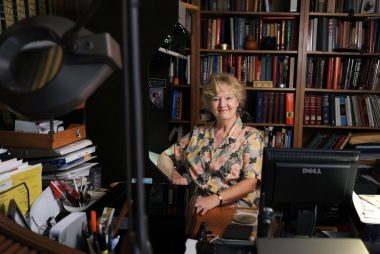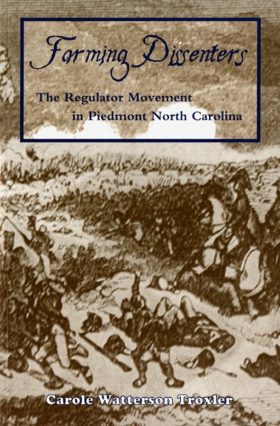Five years before the start of the American Revolution, friction between Piedmont farmers and local court house rings who were tied to eastern North Carolina interests led to the Battle of Alamance on fields a few miles south of where Elon University today sits. That conflict stood as a defining moment for the Regulator Movement, and a new book by professor emerita Carole Troxler examines its roots and influence on the nation’s push for independence.

Published by the North Carolina Department of Cultural Resources, Farming Dissenters: The Regulator Movement in Piedmont North Carolina delves into topics that Troxler said have not been fully explored. Those include the shifting relationship between the Regulators and North Carolinians who were moving toward revolution.
“The outbreak of the Revolution changed the dynamics between people who had sympathized with the Regulators and the eastern establishment who had put them down,” Troxler said. The book “begins to work out the relationship between the Regulator Movement and the Revolution. That’s been a sticky, sticky business, and nobody has really gotten into that before.”
The Department of Cultural Resources recruited Troxler to write the book as a narrative that the general public could easily read and purchase at low cost. “We’re dealing with obscure people, people who didn’t leave vast amounts of their letters and private papers and who haven’t been considered ‘important people,’” she said. “Those kinds of people attract me like flies to honey. I go for that.”
Her research on the dynamics between eastern settlers and Regulators after the Battle of Alamance is specific to the region that is today Orange and Alamance counties in central North Carolina. However, Troxler says she hopes this work may lead other historians to explore the connection between the Regulator defeat and the coming of the American Revolution in other areas of the Piedmont.
“It’s muddy waters, and I think you have to do it on a very local basis,” she said.
Having studied the history of England and the British Empire in graduate school at the University of North Carolina-Chapel Hill, she was also able to examine the way cultural, religious and intellectual facets of the 17th century impacted the Regulators.

“Constitutional values and religious enthusiasm, those two got melded together in the 17th century in the British Isles, and they stayed together on those boats coming to North America and down through the Shenandoah River valley to the backcountry of North Carolina,” she said.
Troxler retired from Elon in 2003 after 33 years of teaching. She has written several books and articles focused on the American Revolution in the southern backcountry and loyalist migration after the war. She is currently working on a biography of Sallie Stockard (1869-1963), an author and historian from Saxapahaw, N.C., and remains connected to the university through the use of Belk Library and participation in an on-campus environmental reading group co-sponsored by Belk Library and the Terra Nova Community Group.
– Written by Kellye Coleman ’12


